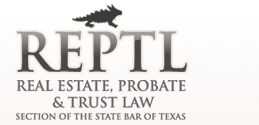Glenn Karisch’s Texas Probate Resources
Welcome to the Texas Probate Resources website, your source for information on estate planning, probate, and trust law in Texas. This site is owned and maintained by Glenn Karisch of Karisch Jonas Law, PLLC, in Austin, Texas. For information dating from before February 1, 2011, visit the legacy site at texasprobate.net.
Texas Probate
Ten things to do now
(This is one of a series of posts about 2011 legislation.)
Most of the legislation passed by the 82nd Texas Legislature becomes effective September 1, 2011. Here are ten things an estate planning and probate attorney should do now to address the new legislation.
1. Change will forms to use streamlined one-step execution
SB 1198 amends Probate Code Section 59 to permit an optional new way for a will to be executed and be made self-proved -- one which requires the testator and two witnesses to sign only once. Attorneys should change their will forms to replace the attestation clause and self-proving affidavit with the new approved language. Here are Word and WordPerfect versions for downloading.
The method is optional, so attorneys may continue to use the traditional two-signature method. However, there seems to be little downside to switching to the new method. The new method will make execution errors much less likely, and it speeds up the signing ceremony. If the client moves to another state which does not recognize a combined attestation and self-proving affidavit, the will still will be just as valid as the two-signature variety, although it may not be considered self-proved. It is likely to be considered self-proved in that state, since Section 2-504 of the Uniform Probate Code permits combined attestations and self-proving affidavits, and the UPC has been enacted in one form or another in 20 states.
The new procedure is available for wills signed on or after September 1, 2011. For more information about this change, see this blog post.
2. Use all of the streamlined forms to speed up document signings
The 2011 change to Section 59 (allowing combined attestations and self-proving affidavits) completes a series of changes begun in 2009 that can speed up document signing ceremonies and save staff time. While updating the will form to use the one-signature method, also check the medical power of attorney, directive to physicians and declarations of guardian to assure that each takes advantage of the 2009 changes:
The medical power of attorney may be acknowledged by a notary instead of witnessed by two witnesses. Tex. Health & Safety Code Sec. 166.154(b). Here is a medical power of attorney form using a notary instead of witnesses in Word format.
The directive to physicians and family or surrogates may be acknowledged by a notary instead of witnessed by two witnesses. Tex. Health & Safety Code Sec. 166.032(b-1). Here is a directive to physicians form using a notary instead of witnesses in Word format.
The declaration of guardian in the event of later incapacity may contain a combined attestation and self-proving affidavit, making it necessary for the declarant and witnesses to sign only once. Tex. Prob. Code Sec. 679(k). Here is a declaration of guardian form using the one-signature method in Word format.
The declaration of guardian for children may contain a combined attestation and self-proving affidavit, making it necessary for the declarant and witnesses to sign only once. Tex. Prob. Code Sec. 677A(i).

As a result of the 2009 and 2011 changes, attorneys can streamline document executions:
If the attorney is a notary, the attorney may meet with the client alone and supervise the signing of any trusts, the statutory durable power of attorney, the medical power of attorney, the directive to physicians, the HIPAA authorization, the funeral directive and any beneficiary designations.
After completing those documents, the witnesses may enter the room for the signing of the will and the declarations of guardian using the new one-signature method.
3. Begin using affidavits in lieu of inventories
SB 1198 amended Section 250 of the Probate Code to permit independent executors and administrators to file an affidavit instead of a detailed inventory if there are no unpaid debts, except for secured debt, taxes and administration expenses, when the inventory is due. The independent executor or administrator still must prepare a verified inventory and deliver it to each beneficiary, but the public disclosure of estate assets and values may be avoided.
Here are Word and WordPerfect versions of a form of affidavit in lieu of inventory for downloading.
Affidavits in lieu of inventory may be used for the estates of decedents dying on or after September 1, 2011. For more information about this change, see this blog post.
4. Change wills to authorize affidavits in lieu of inventories
While it is clear that the legislature intended affidavits in lieu of inventories when the testator's will provided for independent administration, an anomaly in Section 145(b) of the Probate Code raises a possible argument that the required language creating independent administrations negates the right to use an affidavit in lieu of inventory. Section 145(b) provides:
Any person capable of making a will may provide in his will that no other action shall be had in the county court in relation to the settlement of his estate than the probating and recording of his will, and the return of an inventory, appraisement, and list of claims of his estate.
Texas attorneys routinely include this language in wills. A possible interpretation of this language is that, while Texas law might otherwise permit the independent executor to file an affidavit in lieu of inventory, the terms of the will nevertheless require the filing of an inventory. This is implausible and clearly contrary to legislative intent. It is likely to be clarified by 2013 legislation. In the meantime, Texas attorneys should modify this phrase in wills signed in the future to make it clear that the inventory must be filed only if required by law. It probably is overkill to require former clients to re-execute wills with the new language.
Here is the language I recommended:
I direct that no action shall be had in any court exercising probate jurisdiction in relation to the settlement of my estate other than the probating and recording of my will and the return of an inventory, appraisement and list of claims of my estate; provided that, if the independent executor is permitted to file an affidavit in lieu of inventory under Texas law, I do not require the independent executor to file the inventory, appraisement and list of claims with the court.
Bill Pargaman recommended simply adding "...if required by law" to the end of the Section 145(b) language.
For more information, see this blog post.
5. Consider using a summary-form 128A notice
SB 1198 amended Section 128A to permit the executor to include a summary of key provisions in the required notice to beneficiaries instead of enclosing a full copy of the order and will. Under the revised statute, the executor either must enclosed a copy of the will and order or "a summary of the gifts to the beneficiary under the will, the court in which the will was admitted to probate, the docket number assigned to the estate, the date the will was admitted to probate, and, if different, the date the court appointed the personal representative." The summary option also may be used in waivers signed by beneficiaries in lieu of notice.
Should attorneys routinely use the new method? It will save postage and trees not to have to send copies of the order and will. On the other hand, it always is possible that a court later will consider the summary to be incomplete or insufficient. Also, while attorneys can standardize the sending of 128A notices with the will and order attached, use of the summary is likely to require special drafting and editing.
There were other changes to the statute requiring notice to beneficiaries. Fewer persons must be notified.
For old "long form" Section 128A notice and affidavit forms, click here. There are no new "summary form" notices on this site. For more information about Section 128A changes, see this blog post.
6. Complete disclaimers for 2010 decedents by September 16
The tax law passed by Congress in 2010 extended the deadline for disclaiming property that would otherwise be received from a decedent dying between January 1, 20102011, and December 17, 20102011, until 9 months after December 17, 20102011. The Texas legislature made corresponding extensions of the state deadlines for disclaimers. The deadline under federal and state law is September 17, 2011. Since September 17 falls on a Saturday, be sure to complete the disclaimer by Friday, September 16, since it is unclear that the Texas deadline would be extended to the following business day. [corrected September 14, 2011]
7. Make sure to follow the rules for Section 294(d) notices to unsecured creditors
SB 1198 made many changes affecting independent administration. As amended, Probate Code Section 146 makes it clear that Section 294(d) notices to unsecured creditors may be used in independent administrations to bar claims that are not made within 120 days of receipt of the notice. However, when used in an independent administration, the notice must state that a claim may be effectively presented by only one of the methods prescribed by Section 146. Section 146(b-4) prescribes these methods of giving notices by creditors:
A written instrument that is hand-delivered with proof of receipt, or mailed by certified mail, return receipt requested with proof of receipt, to the independent executor or the executor’s attorney;
A pleading filed in a lawsuit with respect to the claim; or
A written instrument or pleading filed in the court in which the administration of the estate is pending.
When representing independent executors, make sure the notice to unsecured creditors contains the proper language. When representing creditors, make sure to respond to the notice in one of the ways required by Section 146.
Here is a form for Section 294(d) notices in independent administrations in Word and WordPerfect formats.
8. Check the power of sale before applying for the next independent administration
SB 1198 makes it clearer whether or not an independent executor or administrator has the power to sell real estate without the joinder of the beneficiaries. If the will does not contain a power of sale provision, Section 145A permits the distributees to agree to give the independent executor or administrator the power of sale. It is important to note that this consent must be obtained before the personal representative is appointed so that the order appointing him or her may state that the power of sale exists. If the personal representative does not obtain the consent of the distributees prior to appointment, it is too late -- each sale of real estate from the estate is likely to require the joinder of the beneficiaries.
Therefore, before applying for the next independent administration, check the will for a power of sale. If there is not a power of sale in the will, consider whether to ask the distributees to agree to the power of sale before filing the application.
The changes to the power of sale in independent administrations are discussed in this blog post.
9. Consider if the 2011 changes create new opportunities for elder law clients
Over the past several sessions, Texas statutes have been amended to make it easier for clients of elder law attorneys to qualify for government benefits programs. The 2011 changes open the door even further.
Now persons with physical disabilities only but with no mental incapacity may apply for the creation of a court-created trust under Section 867 of the Probate Code. This will make it easier for disabled individuals to utilize a special needs trust. The federal statute (42 U.S.C. Sec. 1396p(d)(4)(A)) requires that trusts be created by a parent, grandparent or court. It was unclear if a disabled person with no mental incapacity was eligible for an 867 trust. The 2011 changes make it clear that the trusts are available for disabled persons, who may apply for their creation directly, without the need for a guardianship. Disabled persons also may waive the annual accounting requirement otherwise applicable to 867 trusts.
It is easier than ever to get a qualifying individual's property into a pooled trust subaccount administered under 42 U.S.C. Sec. 1396p(d)(4)(C). Probate Code Section 911 lists the persons who may apply fo the establishment of a subaccount. The list does not include the trustee of a Section 867 trust. However, Section 868C permits the court to order the transfer of the assets of an 867 trust into a pooled trust subaccount, so the trustee may use that statute to, in effect, apply for the creation of a subaccount.
Section 865 of the Probate Code was amended to permit a guardian of the estate or any interested person to apply to the court to transfer a portion of a ward's estate as necessary to qualify the ward for government benefits, but only to the extent allowed by applicable state or federal laws, including rules, regarding those benefits.
Each of these changes was made by SB 1196, the guardianship bill supported by the Real Estate, Probate and Trust Law Section of the State Bar of Texas.
10. Review the new Estates Code
The current Probate Code will be repealed and replaced by the new Estates Code on January 1, 2014. The Texas Legislative Council has been working on the nonsubstantive codification of the Probate Code since 2007. The decedents' estates portion of the code was enacted in 2009. The guardianship and power of attorney portions were enacted in 2011. A corrections bill was passed in 2011. A final corrections bill will be enacted in the 2013 session prior to the January 1, 2014, effective date. Members of the Real Estate, Probate and Trust Law Section have been scouring the new provisions to see if any changes or corrections need to be made. REPTL probably will have a bill making changes in 2013.
Now is a good time to review the new Estates Code. The Texas Legislative Council's website has information about the new code and texts of the legislation. Direct any suggested changes or corrections to me or to Bill Pargaman so that REPTL may consider them.
Claims in independent administrations
(This is one of a series of posts about 2011 legislation.)
Section 146 addresses claims in independent administrations. SB 1198 makes several changes:
Section 294(d) permits personal representatives to give notices to unsecured creditors, and those creditors are required to present their claim within 120 days of receipt of the notice, or the claim is barred. Section 146 makes it clear that Section 294(d) notices may be used in an independent administration. However, when used in an independent administration, the notice also must include a statement that a claim may be effectively presented by only one of the methods prescribed by Section 146. (Here are Section 294(d) notice forms for independent administrations which address the 2011 changes in Word and WordPerfect formats.) Section 146(b-4) prescribes these methods of giving notices by creditors:
A written instrument that is hand-delivered with proof of receipt, or mailed by certified mail, return receipt requested with proof of receipt, to the independent executor or the executor’s attorney;
A pleading filed in a lawsuit with respect to the claim; or
A written instrument or pleading filed in the court in which the administration of the estate is pending.
A secured creditor electing matured secured status must give notice to the independent administrator in one of the methods prescribed in Section 146(b-4) (described above) and must record a notice of the creditor’s election in the deed records of the county in which the real property is located.
A secured creditor electing matured secured status in an independent administration is entitled to the priority granted by the Probate Code, but the creditor is not entitled to exercise any remedies in a manner that prevents the payment of higher priority claims and allowances and, during the estate administration, is not entitled to exercise any contractual collection rights, including the power to foreclose, without either the prior written approval of the independent executor or court approval. If the secured creditor elects matured secured status, the independent executor and not the secured creditor is empowered to sell the property if necessary to pay the claim. Still, the creditor with matured secured status is not powerless to protect itself. Section 146(b-1)(2) permits the matured secured creditor to seek judicial relief or to execute a judgment against the independent executor. Section 146(b-1)(3) coordinates with the no right to exoneration of lien statute (Section 71A), requiring the independent executor either to collect from the devisees the amount needed to pay the debt or to sell the property to raise money to pay the debt.
A secured creditor with preferred debt and lien status is free to exercise judicial or extrajudicial collection rights, including the right to foreclose and execution, but the creditor may not conduct a nonjudicial foreclosure sale within 6 months after letters are granted.
In an independent administration, presentation of a statement of claim or a notice with respect to a claim to an independent executor does not toll the running of the statute of limitations with respect to that claim. Except as otherwise provided in Section 16.062 of the Civil Practices and Remedies Code, the running of the statute of limitations in an independent administration is tolled only by:
Written approval of a claim signed by an independent executor;
A pleading in a suit pending at the time of the decedent’s death; or
A suit brought by the creditor against the independent executor.
Section 146(b-7) states plainly that, other than as provided in Section 146, the procedural provisions of the Probate Code governing creditor claims in supervised (dependent) administrations do not apply to independent administrations. Among the procedural provisions that do not apply to independent administrations are Section 306(f) – (k) and Section 313. A creditor’s claim is not barred solely because the creditor failed to file a suit not later than the 90th day after the date an independent executor rejects the claim or fails to act with respect to a claim.
Section affected: Probate Code Section 146.
Inherited IRAs are Exempt from Creditors’ Claims
(This is one of a series of posts about 2011 legislation.)
SB 1810 amends Section 42.0021 of the Property Code to provide that all IRAs, including inherited IRAs, are exempt from creditors' claims. It provides that the interest of a person in an IRA acquired by reason of the death of another person is exempt to the same extent that the interest of the person from whom the account was acquired was exempt on the date of the person's death.
The exempt status of inherited IRAs was called into question by In re Jarboe, 2007 WL 987314 (Bankr. S. D. Tex 2007), and by similar cases across the country.
Section affected: Property Code Section 42.0021.
Will unsworn declarations invade probate practice?
(This is one of a series of posts about 2011 legislation.)
Because of HB 3674, which flew under the radar in 2011, arguably it is no longer necessary to have a notary in most cases were a sworn statement or affidavit is made. The statute amends Section 132.001 of the Civil Practice and Remedies Code – which previously only dealt with unsworn statements by inmates – to provide that an “unsworn declaration may be used in lieu of a written sworn declaration, verification, certification, oath, or affidavit required by statute or required by a rule, order, or requirement adopted by law.” The unsworn declaration must be in writing and subscribed by the person making the declaration as true under penalty of perjury. A specifc form of non-notarized jurat must be used. There are exceptions for an oath of office or an oath required to be taken before a specified official other than a notary public. The bill becomes effective September 1, 2011, and applies to unsworn declarations made on or after that date.
Is a will containing an unsworn declaration self-proved as required by Section 59 of the Probate Code? Probably not. For one thing, the testator and each witness would have to make an unsworn declaration, not just the testator. For another, a court is likely to find that the use of an unsworn declaration is not “in form and contents substantially” as required by Section 59. Also, since the consequences of a court’s refusal to accept an unsworn declaration on a will is that it is not self-proved (rather than that it is not entitled to probate), it is hard to imagine anyone appealing a decision of a court refusing to accept it.
Sworn statements are permitted or required at least 70 times in the decedents’ estates portion of the Probate Code. (The author grew tired of counting before getting to guardianships.) With some of these statutes, it may be appropriate to permit someone to make an unsworn declaration under penalty of perjury rather than a notarized statement. In others, it clearly is a bad idea.
Time will tell if probate judges will permit the use of these declarations. In the meantime, the simple, worry-free answer for a probate practitioner is to use notarized sworn statements and affidavits.
New will-signing procedure: the testator and witnesses need sign only once
(This is one of a series of posts about 2011 legislation.)
Under prior law, in order to make a will self-proved, the testator and each witness had to sign the will twice – once on the will itself and once on the self-proving affidavit. SB 1198 amends Section 59 of the Texas Probate Code to permit combining the execution of the will with the signing of the self-proving affidavit so that the testator and witnesses only have to sign once. The statute includes the appropriate language to include in the will if the one-signature method is desired.
The one-signature method is optional. Testators still may use the two-signature method.
The change to Section 59 corresponds with changes to Sections 677A and 679 made in 2009 which adopted a one-signature method for declarations of guardian. Other changes in 2009 made it possible to use a notary public in lieu of witnesses on medical powers of attorney and on directives to physicians and family or surrogates. As a result of the 2009 and 2011 changes, attorneys may greatly streamline the document signing ceremony:
The statutory durable power of attorney, medical power of attorney and directive to physicians or family and surrogates may be executed before a notary public, and no witnesses are required.
The will, the declaration of guardian for minor children and the declaration of guardian in the event of later incapacity require two witnesses, but the testator/declarant and the witnesses need sign only once.
The new will-signing method becomes available on September 1, 2011.
Probate inventory may be kept private
This is one of a series of posts about 2011 legislation.
The 2011 legislative change that is likely to have the biggest impact on Texas probate lawyers is SB 1198’s amendment to Section 250 of the Probate Code permitting independent executors to file an affidavit in lieu of an inventory, appraisement and list of claims if there are no unpaid debts, except for secured debts, taxes and administration expenses, at the time the inventory is due. The public disclosure of information in the inventory is unpopular with clients and drives some Texans to use a living trust-based plan when a will otherwise would suffice.
Here are the particulars of the change:
Only independent executors and independent administrators are permitted to file an affidavit in lieu of an inventory. Dependent administrators must file a public inventory.
The affidavit may be used if there are no unpaid estate debts, other than secured debts, taxes and administration expenses, at the time the inventory is due. If the independent executor can pay all unsecured debts between the date he or she qualifies and the due date of the inventory, the independent executor can avoid the public disclosure of inventory information.
The change does not mean that it no longer is necessary to prepare an inventory. The independent executor still must prepare a verified, full and detailed inventory and deliver it to each estate beneficiary.
Any person interested in the estate – specifically including a possible heir of the decedent or a beneficiary named in a prior will – is entitled to receive a copy of the inventory on request. The independent executor is protected from liability to the estate or its beneficiaries if he or she provides a copy of the inventory to a person the independent executor believes in good faith “may be” a person interested in the estate. If the independent executor refuses to give a person a copy of the inventory, he or she may apply to the court to compel the independent executor to do so.
The change to Section 250 necessitates changes to a number of related sections. An independent executor may be removed if he or she fails to file an inventory or the affidavit in lieu of aninventory (Section 149C). Successor independent executors also may file an affidavit in lieu of an inventory (Section 227). If additional property or claims are discovered, the independent executor either must file a supplemental inventory or a supplemental affidavit in lieu of an inventory (Section 256). The setting apart of exempt property (Section 271), the setting of the family allowance (Section 286) and the sale of property to raise funds for the family allowance (Section 293) are tied to the filing of the inventory or an affidavit in lieu of an inventory.
While Section 250 permits the independent executor to choose to file an inventory or an affidavit in lieu of an inventory, beneficiaries may believe that the independent executor has breached his or her duties if (a) he or she fails to use the affidavit in lieu of an inventory if the estate is eligible to do so and (b) he or she fails to quickly pay the decedent’s unsecured debts (if it is possible to do so) in order to make the estate eligible for the affidavit in lieu of inventory. It may be hard for the independent executor to justify making an unnecessary public disclosure of asset information.
This change should make will-based plans more popular. Clients still may wish to use living trusts for other reasons (out-of-state real property, disability planning or fear of a will contest, for example), but they may not have to forego a will-based plan merely to avoid a public disclosure of information.
An affidavit in lieu of an inventory may be used for the estates of decedents dying on or after September 1, 2011. For persons who died before September 1, 2011, an inventory must be filed, even if the inventory is filed after September 1, 2011.
Significant changes to Section 128A notices to beneficiaries
This is one of a series of posts about 2011 legislation.
The 2007 amendment to Probate Code Section 128A caused much grumbling among probate lawyers. It required the personal representative of a testate decedent to send certified mail notices to (or obtain waivers from) all beneficiaries named in the will. The 2007 changes were a rush job to address concerns expressed in the Legislature over a sensational case in Travis County in which an independent executor was accused of misappropriating estate funds without ever telling the estate beneficiaries that he was the executor and that they had an interest in the estate. Because it was a rush job, 2007’s Section 128A was rough around the edges and went further than has proven to be necessary.
SB 1198 amends Section 128A to make the rules about notices to beneficiaries much easier to meet. Here are the key changes:
The notice does not have to be given to a beneficiary who is receiving $2,000 or less worth of property or who has received all gifts to which he or she is entitled within 60 days of the order admitting the will to probate.
The notice or waiver need not include a copy of the will and the order admitting it to probate if it includes a written summary of the gifts to the beneficiary under the will, the court in which the will was admitted to probate, the docket number assigned to the estate, the date the will was admitted to probate and, if different, the date the court appointed the personal representative.
The personal representative does not need to notify a beneficiary of a trust whose right to receive income distributions is at the sole discretion of the trustee if the trustee has given the notice to an ancestor of the beneficiary and there is no apparent conflict of interest between the ancestor and the beneficiary. This change may offer some help in the case of trusts permitting distributions to all of a person’s descendants, but it will not help if the distribution standard is based on the health, education, maintenance and support needs of the beneficiary, since this is not a wholly discretionary standard.
SB 1198 clarifies that notices are not required if the will is probated as a muniment of title and that notices are not required to a person whose interest arises on the occurrence of a contingency which has not occurred.
The changes made by SB 1198 apply to the estate of a decedent dying on or after September 1, 2011. The old law must be followed for persons dying before that date.
2011 Texas Legislative update
Glenn Karisch's 2011 Texas Legislative Update is now available here in pdf format. This covers all of the key probate, guardianship and trust law changes made in the regular and first called session of the 82nd Texas Legislature. Most of the changes become effective September 1, 2011. Subject-by-subject excerpts will be posted to this site shortly.
Bill Pargaman's excellent and comprehensive legislative update is available here in pdf format. Bill's paper includes the full text of the Probate Code and Trust Code changes.
Sine die
The 2011 regular session of the Texas Legislature ended May 30, 2011. Governor Perry has until June 19, 2011, to sign or veto bills. While the legislature is meeting in special session as of this writing (June 8, 2011), it is unlikely that any probate, guardianship or trust legislation will be enacted in this or any other special session. Most enacted legislation becomes effective September 1, 2011.
There are summaries of each enacted bill in the 2011 Legislation portion of The Texas Probate Website. Bill Pargaman's excellent and comprehensive legislative update is available online here. Here are some of the key changes:
You won't have to file an inventory in most independent administrations.
SB 1198 amends Section 250 of the Probate Code to permit an independent executor to file an affidavit in lieu of an inventory if there are no unpaid debts, except for secured debts, taxes and administrative expenses, at the time the inventory is due. The independent executor still must prepare an inventory and send a copy to each beneficiary, but the public disclosure of the decedent's assets which results from filing a probate inventory will no longer be required in the vast majority of estates.
The testator and witnesses need to sign the will only once.
SB 1198 amends Section 59 to allow a combined execution of the will and self-proving affidavit so that the testator and witnesses are required to sign only once, instead of having to sign both the will and the self-proving affadavit. The old way still works, but this provides a new way to speed up will signings.
Survivorship accounts -- the worst part of Holmes v. Beatty is overruled.
SB 1198 amends Sections 439 and 452 to make it clear that, for both community property and non-community property multiple party accounts, a survivorship agreement will not be inferred from the mere fact that the account is a joint account or that the account is designated as JT TEN, Joint Tenancy, or joint, or with similar language. The effective date provision makes it clear that this was intended to expressly overrule Holmes v. Beatty, 290 S.W.3d 852 (Tex. 2009).
Changes to Section 128A notices to beneficiaries.
SB 1198 amends Section 128A to make it easier on personal representatives. No notice is required if the beneficiary receives property worth $2,000 or less or if the beneficiary receives all property to which he or she is entitled within 60 days of the order admitting the will to probate. The notice need not include a copy of the will and the order admitting it to probate if the notice includes a summary of the gifts to the beneficiary, the court in which the will is probated and the docket number assigned to the case. The bill clarifies other issues about 128A notices.
Power of sale in independent administrations.
SB 1198 attempts to clarify whether or not an independent administrator has the power to sell real property. In cases where there is no will or the will does not give the independent administrator or executor the power of sale, Section 145A permits the distributees of the estate to agree at the time the personal representative is appointed to consent to granting the power of sale, in which case the court will include the power of sale in the order appointing the independent administrator or executor. Section 145C attempts to clarify in which cases independent executors have the power of sale.
Deadline to make disclaimers extended to match 2010 tax law.
SB 1197 and SB 1198 change the disclaimer provisions in the Trust Code and Probate Code, respectively, to extend the deadling for persons dying after December 31, 2009, but before December 17, 2010, until 9 months after December 17, 2010. The tax law enacted by Congress in December 2010 gave those decedents until that date to disclaim for federal tax law purposes, so the Texas law change matches the federal change.
Creditor protection for inherited IRAs.
SB 1810 amends Section 42.0021 of the Property Code to provide that all IRAs, including inherited IRAs, are exempt from creditors' claims. It provides that the interest of a person in an IRA acquired by reason of the death of another person is exempt to the same extent that the interest of the person from whom the account was acquired was exempt on the date of the person's death. The exempt status of inherited IRAs was called into question by In re Jarboe, 2007 WL 987314 (Bankr. S. D. Tex 2007), and similar cases across the country.
REPTL bill tweaks independent administration
HB 2046 fine-tunes Texas statutes on independent administration for inclusion in the new Estates Code. While the changes are minor in the overall scheme of things, each change may be important in particular cases.
Rep. Will Hartnett
Will Hartnett, Author of HB 2046The bill, authored by Rep. Will Hartnett (R-Dallas), is the work of the Real Estate, Probate and Trust Law Section of the State Bar of Texas. It is part of the Section's multi-year effort to address certain key subjects prior to the change to the Estates Code on January 1, 2014. Most of the changes in HB 2046 were included in REPTL's 2009 legislation. The 2009 legislation (HB 3085) failed to pass because of a logjam at the end of the session.
Which rules apply to independent administrations?
Many of the changes clarify if certain rules applicable to dependent administrations also apply to independent administrations. For example, new Section 145B would affirmatively state the authority of an independent executor to act:
Unless this code specifically provides otherwise, any action that a personal representative subject to court supervision may take with or without a court order may be taken by an independent executor without a court order. The other provisions of this part are designed to provide additional guidance regarding independent administrations in specified situations, and are not designed to limit by omission or otherwise the application of the general principles set forth in this part.
Since Section 3(q) of the Probate Code includes "independent administrator" within the definition of "independent executor," Section 145B and other provisions referring to "independent executor" also include independent administrations of intestate decedents and independent administrations with will annexed.
Power of sale
HB 2046 makes substantive changes to the power of independent executors to sell property from the estate. New Section 145C sets out the general rules:
Independent executors have the power of sale of estate property set forth in the will without the need for court approval.
In addition, unless limited by the terms of a will, independent executors have the same authority to sell estate property that dependent administrators have, but without the need for court approval and without the need to follow the procedural requirements applicable to dependent adminstrations.
Third parties are protected and need not inquire into an independent executor's power of sale (A) if the power of sale is granted in the will or in the order appointing the independent executor or (B) if the independent executor provides an affidavit to the third party that the sale is necessary or advisable to pay expenses of administration, funeral expenses and expenses of last sickness of decedents, and allowances and claims against the estates of decedents.
The protection granted to third parties does not relieve the independent executor from any duty owed to a devisee or heir.
These rules do not limit the authority of the independent executor to enter into leases or borrow money.
One negative comment about these changes is that they expand the power of sale granted in the will to an independent administrator with will annexed. The power of sale may be viewed as a personal right granted to the independent executor named by the testator and should not extend to an independent administrator not named by the testator.
HB 2046 deals with the problem of independent administrations in cases where the will does not grant the power of sale by giving the applicant the opportunity to obtain the consent of all devisees or heirs to the power of sale. Section 145A provides that, if all devisees or heirs agree to give the independent aexecutor the power of sale, then the court may include that authority in the order appointing the independent executor. The power of sale issue must be raised prior to the appointment of the personal representative.
Creditors' claims in independent administrations
Section 294(d) notices and creditor response. Most of HB 2046's changes affecting creditors' claims clarify the procedural aspects of those claims. For example, under current law an independent executor may give a notice to unsecured creditors under Section 294(d) by certified or registered mail, return receipt requested, and claims which are not made within 4 months of the notice are barred. New Section 146(a-1) would require the Section 294(d) notice to include a statement that "a claim may be effectively presented by only one of the methods prescribed by this section." Section 146(b-4) would require the creditor to perfect its claim by (1) written instrument that his hand-delivered with proof of receipt or mailed by certified mail, return receipt requested with proof of receipt, to the independent executor or the executor's attorney; (2) a pleading filed in a new lawsuit with respect to the claim; or (3) a written instrument or pleading filed in the court in which the administration of the estate is pending. This means that communications from creditors which are not sent by certified mail will not be sufficient to overcome the Section 294(d) bar.
Matured secured claims. Practitioners have different opinions about how matured secured claims are handled in independent administrations. Some think that, having elected matured secured status, the creditor may not then exercise its nonjudicial foreclosure right and instead must rely on the independent executor to sell the secured property in due course of administration. Others think that a creditor with a matured secured claim retains the nonjudicial foreclosure right. Section 146(b-1) would clarify this issue by providing that creditors with matured secured claims do not have the power to conduct a nonjudicial foreclosure, but they retain the right to seek judicial relief or to execute a judgment against an independent executor. Section 146(b-1)(3) would provide a means by which the independent executor may collect the amount of the matured secured debt from the devisees. If the devisees do not pay the debt, then the independent executor must sell the property and pay the money as it is paid in a dependent administration.
Preferred debt and lien claims. Section 146(b-2) would make clear that a secured creditor electing preferred debt and lien status is free to conduct a nonjudicial foreclosure but must wait 6 months after letters testamentary are granted.
Tolling of the statute of limitations. Under current law, Section 16.062 provides that the death of a person against whom or in whose favor there may be a cause of action suspends the running of an applicable statute of limitations for 12 months after the death, but this period is shortened to the date of qualification if a personal representative qualifies within 12 months after death. HB 2046 would keep that general rule, but would add (in new Section 146(b-6)) that the running of a statute of limitations shall be tolled only by written approval of a claim signed by an independent executor, a pleading filed in a suit pending at the time of the decedent's death or a suit brought by the creditor against the independent executor. Thus, the presentation of a statement of claim or a notice with respect to a claim would not toll the running of the statute of limitations with respect to that claim.
Other claims procedures do not apply. New Section 146(b-7) would wrap up the statute regarding claims in independent administrations by making it clear that the other procedural provisions governing creditor claims in "supervised" administrations do not apply. To further avoid confusion, that section states specifically that:
Section 313 does not apply to independent administrations, so a creditor's claim is not barred by its failure to sue on a rejected claim within 90 days.
Sections 306(f) - (k) regarding secured claims do not apply to independent administrations.
Closing independent administrations
HB 2046 would retain the seldom-used closing affidavit procedure for closing an independent administration, although it calls those affidavits "closing reports" (Section 151). It would add a new alternative closing procedure. Under Section 151 (b) the independent executor may file a sworn notice of closing the estate, stating:
all debts have been paid to the extent permitted by the assets in the independent executor's possession;
all remaining assets have been distributed; and
the names and address of the distributees to whom property was distributed.
Jose Rodriguez, Author of SB 1198Before filing such a notice, the independent executor must give each distributee a copy of the notice and the filed notice must include signed receipts or other proof that all distributees have received a copy of the notice.
HB 2046 also changes the Estates Code
HB 2046 also contains parallel provisions putting these same changes into the new Estates Code. The changes noted above would become effective September 1, 2011, if HB 2046 is enacted.
Update: On March 4, 2011, Sen. Jose Rodriquez (D-El Paso), filed SB 1198 as REPTL's decedent's estates bill in the Senate.
REPTL decedents' estates bill is worth a closer look
HB 2046 would make key changes affecting every estate planning and probate lawyer in Texas.
Rep. Will Hartnett (R-Dallas) filed HB 2046 Wednesday. This bill makes numerous changes to the Texas Probate Code that are supported by the Real Estate, Probate and Trust Law Section of the State Bar of Texas.
Signing wills just once
Among the highlights of HB 2046 is a new way to handle will executions in Texas. Current law requires the testator and two witnesses to sign the will and then, if the will is self-proved, to separately sign the self-proving affidavit. HB 2046 amends Section 59 to provide the option of having the testator and witnesses sign a combined will and self-proving affidavit so that each only has to sign once. This is a holdover change from 2009. The 2009 bill failed to pass because of a legislative logjam at the end of the session.
This change, along with others made in 2009 regarding the execution of declarations of guardian, medical powers of attorney and directives to physicians, should speed up document signings. Old foagies who like the current two-signature method may continue to use it.
Independent administration changes
Another holdover from 2009 are changes to independent administration. REPTL proposed these changes to clarify Texas's independent administration statutes in anticipation of their inclusion in the new Estates Code which takes effect January 1, 2014. If HB 2046 passes, these changes would take effect September 1, 2011, and be carried forward into the Estates Code.
The proposed independent administration changes will be covered in a separate post.
No need to file an inventory
Living trust proponents frequently tout the increased privacy of those plans over will-based plans since in a will-based plan an inventory must be filed with the court. HB 2046 would change this for independent administrations in cases where there are no unpaid debts, except for secured debts, taxes and administration expenses. In that case, the independent executor could file an affidavit in lieu of an inventory. The affidavit must state that the independent executor has provided each beneficiary with a "verified, full, and detailed inventory."
The changes to Section 250 would not do away with the requirement of preparing an inventory; it would do away with the filing of the inventory in some cases. Interestingly, under current law the personal representative is not required to provide a beneficiary with a copy of the inventory, although doing so is good practice. The new law would require delivery of a copy in order to avoid the filing requirement.
As filed, it appears that dependent administrators also could file an affidavit in lieu of filing an inventory. A change is in the works to limit this procedure to independent administrations, for obvious reasons.
Overruling Holmes v. Beatty
Holmes v. Beatty, 290 S.W.3d 852 (Tex. 2009), caused shockwaves in the probate and estate planning community for two reasons:
Will Hartnett, Author of HB 2046
First, and most importantly, the Supreme Court relaxed the standards for creating rights of survivorship with respect to community property, holding that a " joint tenancy" or " JT TEN" designation on an account is sufficient to create rights of survivorship in community property under Section 452 of the Texas Probate Code.
Second, the Supreme Court held that stock certificates issued from a community property with right of survivorship brokerage account continue to be survivorship property even though the the certificates themselves do not meet the requirements for survivorship agreements.
Will Hartnett, Author of HB 2046HB 2046 overturns Holmes on the first of these points. It would add this sentence to Section 452: "A survivorship agreement will not be inferred from the mere fact that the account is a joint account or that the account is designated JT TEN, Joint Tenancy, joint, or other similar abbreviation." Parallel language is added to Section 439, which governs non-community property multi-party accounts. HB 2046 specifically states that the bill is intended to overturn the ruling of the Texas Supreme Court in Holmes v. Beatty.
The bill is silent on the other significant holding in Holmes, so stock certificates issued out of community property with right of survivorship accounts may continue to be survivorship property, at least to the extent described in Holmes.
Reasonable compensation for executors
Jose Rodriguez, Author of SB 1198
Jose Rodriguez, Author of SB 1198The bill also would change the default basis for compensation of personal representatives of decedents' estates. Currently compensation is based on 5% of all sums received in cash plus 5% of all sums paid out in cash, subject to the limitations stated in Section 241. HB 2046 would replace this with a "reasonable compensation" standard. HB 1837 makes a similar change for guardianships.
Update: On March 4, 2011, Sen. Jose Rodriquez (D-El Paso), filed SB 1198 as REPTL's decedent's estates bill in the Senate.
Ad litem fees and attorneys' fees in guardianships: who pays?
Who should pay attorney ad litem fees, guardian ad litem fees, the applicant's attorneys' fees and other costs when someone applies for the creation of a guardianship? Three bills now pending in the Texas Legislature take different approaches.
Jane Nelson, Author of SB 220
Under Section 665A of the Texas Probate Code, the proposed ward's estate is charged with attorney ad litem fees, guardian ad litem fees and other costs -- whether or not the application for appointment of a guardian is successful -- unless his or her estate is insufficient to pay those fees and costs, in which case the county bears the expense.
Under Section 665B, if a guardianship or management trust is created, the court may order that any applicant's attorneys' fees be paid from the ward's estate, or from the county treasury, if the court finds that the applicant acting in good faith and for just cause.
Is it fair that the ward's or the proposed ward's estate is required to pay the costs of the attorney ad litem or guardian ad litem? Are there times when another party should have to bear those expenses? Should the county treasury be stuck with ad litem fees and costs and the applicant's attorneys' fees if the proposed ward's estate is insufficient to pay them?
Chris Harris, Author of SB 286
SB 286 would add this sentence to Section 665A: "The court may allocate attorney's fees taxed as costs under this section among the parties as the court finds is fair and just." This bill, authored by Sen. Chris Harris (R-Arlington), would allow the judge to make another party pay the costs of attorneys ad litem, guardians ad litem, interpreters, etc., if it is "fair and just" to do so. Section 665B is amended to permit the applicant's attorneys' fees to be allocated among the parties to the guardianship proceeding "as the court finds is fair and just," so long as a guardianship or management trust is created. SB 286 also requires ad litem fees under Section 665A and the applicant's attorneys' fees under Section 665B to be set in an amount which is "fair and just."
SB 220 takes a similar approach. This bill, authored by Sen. Jane Nelson (R-Flower Mound), amends Section 665A to permit the court to "allocate amounts taxed as costs under this section among the parties as the court finds is just and equitable." It provides that, if the proposed ward's estate is unable to pay "the costs allocated to the proposed ward," the county is responsible for those costs. SB 220 also amends Section 665B to permit the applicant's attorneys' fees to be "allocated as the court finds is just and equitable," so long as the court creates a guardianship or management trust.
Surely if it is "fair and just" to allocate costs and fees to a party under SB 286, it also will be "just and equitable" to do so under SB 220. Perhaps the bills could be reconciled so that costs and fees are allocated if it is "fair, just and equitable" to do so.
Will Hartnett, Author of HB 1325
HB 1325 gives the court less authority to charge others with ad litem fees. This bill, authored by Rep. Will Hartnett (R-Dallas), would add subsection (b) to Section 665A: "If the proposed ward's assets are insufficient to pay for the cost of an attorney ad litem appointed under this chapter, the court may order the applicant in the guardianship proceeding to pay that cost." A similar change to Section 669 would provide the same treatment for guardian ad litem fees.
HB 1325 would allow the court to relieve the county treasury of the obligation to pay an attorney ad litem or guardian ad litem if the proposed ward's estate was unable to bear that cost. It would not permit assessing these costs against the applicant or other parties if the proposed ward's estate is able to bear them. The authority of the court to assess costs and the applicant's attorney's fees in SB 220 and SB 286 does not depend on whether or not the proposed ward is unable to pay those costs and fees.
Some judges have wanted the power to assess costs and fees in guardianships against litigants whose conduct demonstrates that they should bear them. SB 220 and SB 286 give them that authority. HB 1325 does not.
REPTL bills would make changes to trusts, guardianships and powers of attorney
Rep. Will Hartnett (R-Dallas) filed three bills supported by the Real Estate, Probate and Trust Law Section of the State Bar of Texas Friday.
The most significant is HB 1858, which is a new Durable Power of Attorney Act for Texas. It would replace the current statutory durable power of attorney form for a new form with a disclosure statement and places for the principal to specify if he wants the agent to be able to create, revoke amend trusts; make gifts; create or change rights of survivorship; create or change beneficiary designations; and waive the principal's right to be a beneficiary of a joint and survivor annuity. Most of the changes are based on the new Uniform Power of Attorney Act adopted by the National Conference of Commissioners on Uniform State Laws in 2006. It replaced the old Uniform Durable Power of Attorney Act upon which Texas's current power of attorney statutes are based. The new act is more specific about the agent's duties and responsibilities.
Will Hartnett, Author of HB 1835, HB 1837 and HB 1858
Will Hartnett, Author of HB 1835, HB 1837 and HB 1858HB 1837 would make numerous changes to Texas's guardianship statutes, including replacing the current 5% of income, 5% of disbursements method of determining guardianship compensation with a "reasonable compensation" standard. It also would permit a person with a physical disability only eligible to apply for the creation of a guardianship management trust (867 Trust).
HB 1835 makes mostly minor and technical changes to the Texas Trust Code. One change of significance to persons handling estates of 2010 decedents is an extension of the 9-month deadline for disclaimers to match the one in the 2010 tax act.
Jose Rodriguez, Author of SB 1192, SB 1196, SB 1197 and SB 1198
Jose Rodriguez, Author of SB 1192, SB 1196, SB 1197 and SB 1198Another REPTL bill -- making changes affecting decedents' estates -- is expected but has not yet been filed.
Update: On March 2, 2011, Rep. Hartnett filed HB 2046, which is REPTL's decedent's estates bill. Sen. Jose Rodriquez (D-El Paso), filed identical REPTL bills in the Senate on March 4, 2011:

















